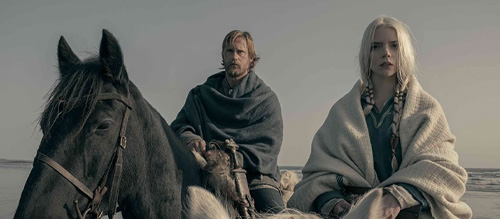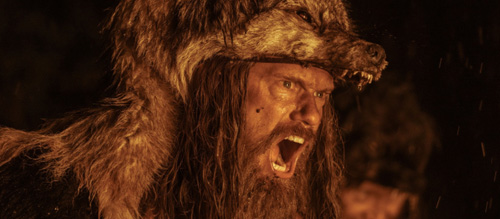The Northman (2022) Review
The Northman (2022)
Director: Robert Eggers
Screenwriters: Sjón, Robert Eggers
Starring: Alexander Skarsgård, Nicole Kidman, Claes Bang, Ethan Hawke, Anya Taylor-Joy, Gustav Lindh, Elliot Rose, Willem Dafoe, Björk
Like a supermodel lovechild of Conan the Barbarian and “Hamlet”, Robert Eggers’ third film, The Northman (2022), delivers guts, glory, and gore-stained abs in wonderful, reckless abandon. Following the murder of his father by his uncle, young Amleth flees into hiding, coming back many years later, disguised as a slave, to take his vengeance and rescue his mother, according to the fate bestowed upon him by the Norse gods.
There’s no doubting the astonishing beauty that Eggers and cinematographer Jarin Blaschke have accomplished here. In almost Kubrickian fashion, every frame truly is a Rembrandt, lending the film the grand, mythical scope it is aiming for. The sound design by Jimmy Boyle drags you into the moment, and the droning score of Robin Carolan and Sebastian Gainsborough works admirably considering it is the feature film compositional debut of each of them. It is Viking pomposity immortalised in celluloid.
Most of the cast are great, though Nicole Kidman is perhaps miscast as Queen Gudrún, with the accent failing her at times and the actress not quite having the presence and power when she needs it. Still, Alexander Skarsgård does his best as the brooding, humourless prince hell-bent on revenge, Anya Taylor-Joy gives the film some of its only moments of light-heartedness, and Claes Bang pulls off the villain admirably.
This is Eggers’ biggest film yet, and as a result it is perhaps his most predictable. From the moment that brother Fjölnir (Bang) walks into the room in the film’s beginning, you can predict almost everything that will happen purely based on how he walks. We know who he is, what must happen to him, what will befall our prince, and how the finale will come about. Everything else is just watching it play out. Having this structure and plot isn’t too much a detriment, for it’s a classical tale told for thousands of years across hundreds if not thousands of different cultures, and its mythical setup fits the setting, tone, and genre (the film is apparently loosely based on a Danish folk tale which inspired “Hamlet”, hence it feels tragic and Shakespearean). But, considering the madness of The Lighthouse, and the kicker ending of The Witch, one might be forgiven for wanting something a little bit extra, a final twist in the tale. Still, a naked swordfight on the burning slopes of Mount Hekla is a sight to behold.

Additionally, though the direction is wonderfully choreographed, utilising mostly longer takes with minimal cutting and editing, it might also make it harder to get to the characters emotionally. At many times the audience is pulled back to a kind of fly-on-the-wall situation, simply watching everything play out; sometimes it feels just a little too choreographed. We are asked to observe what happens, and to appreciate its presentation and themes, and the consequences of the characters’ actions, but often not to participate in it. Some may see this as fitting of the themes of the story, that everything is predetermined by the gods, moving swiftly along on choreographed paths by steadicam and track, whilst others might wish at times to feel more involved with the action, to really experience what’s going on against the green slopes of Iceland.
That the film is impeccably put together is a certainty. That the film is an incredible experience on the big screen is also true. But that there are a few missteps, moments of style over substance, when there’s just a tiny little something out, which stops it from being a true masterpiece, is also true. Regardless, three films in, and Eggers’ third might be the best of the lot.
19/24


